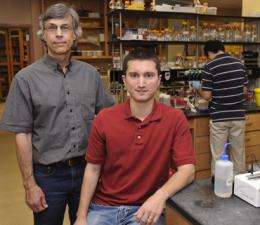Researcher develops green, bio-based process for producing fuel additive

(PhysOrg.com) -- A new green, bio-based method for producing a much-used fuel additive and industrial chemical that is currently made from petroleum products has been developed by an Iowa State University researcher.
Thomas Bobik, professor of biochemistry, biophysics and molecular biology, invented a process for manufacturing isobutene (isobutylene) by identifying a new, natural enzyme that produces the fuel organically.
Bobik, along with David Gogerty, a doctoral student working with him on the project, believe that once more research is completed, there could be huge benefits to the biofuels industry.
"I would emphasize that we are very early on in the process," said Bobik. "But isobutene has some special properties that could have a big impact."
Bobik's enzyme makes it possible to convert the glucose found naturally in plants to make isobutene. The enzyme is found naturally in about half of all organisms in the world.
While patent applications proceed, Bobik will not disclose the specific enzyme.
Isobutene is a gas used to produce chemicals and also in the manufacturing of fuel additives, adhesives, plastics and synthetic rubber.
It can be chemically converted to isooctane, which is a fuel that could be used to replace gasoline additive methyl tert-butyl ether (MBTE), which can be environmentally harmful.
Isooctane is used in gasoline to stop engine knocking and other problems. Currently, isooctane is produced from petroleum products.
By using his naturally occurring, biological process to produce isobutene, Bobik believes there will be environmental and cost benefits to the biofuels industry.
Currently, one of the biggest expenses in producing the biofuel ethanol is the cost of separating the ethanol from the water where it's made. Bobik's new process will not include the cost of separation.
"Isobutene is a gas, so we can imagine that it will be easy to remove the isobutene from the vessel in which it was made, and that should be a very cheap and efficient way to purify the biofuel," said Bobik.
One of the drawbacks, Bobik warns, is the process currently takes too long.
"The activity of the enzyme (in making the isobutene) is low," Bobik said. "It's too low for commercial application. So we're trying to use directed enzyme evolution to improve the activity of the enzyme so it can become commercially viable."
Directed enzyme evolution is the effort to engineer enzymes to perform certain functions. In this case, it is trying to find a way to get the enzyme to produce isobutene more quickly than in nature.
Bobik says progress is being made rapidly and perhaps, within 10 years, motorists may be using a bio-based, environmentally friendly ingredient in their gas tanks every time they fill up.
Provided by Iowa State University
















